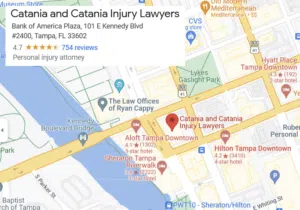
When an accident happens, sometimes it’s easy to determine who’s at fault. In other cases, multiple parties can share fault for the same accident.
The law uses contributory fault rules to distribute fault and apportion damages between multiple at-fault parties. If you have legal questions about your case, then it is important that you speak to an experienced personal injury attorney.
Table of Contents
The Different Types of Fault
Each state has its own personal injury laws. When fault is not at issue, then the value of the case becomes the most important issue. When multiple people are at fault for an accident, the case will focus on each party’s percentage of fault. This, in turn, will determine how many different parties owe an injury victim damages or how much a victim’s damages should be reduced based on their contributions to the accident.
There are three main theories of fault that states follow for personal injury cases: pure comparative fault, modified comparative fault, and contributory fault.
What is Contributory Fault?
Contributory fault is the harshest fault standard. Under pure contributory fault, you will not be eligible for any compensation if you share any fault for an accident. If you are 1% at fault, then you will get no recovery of any kind.
This standard is still the law in four states (Alabama, Maryland, North Carolina, and Virginia) and the District of Columbia. If your accident happened outside of these states, then you can avoid pure contributory fault.
What is Comparative Fault?
Comparative fault is further divided into two categories: pure comparative fault and modified comparative fault. Pure comparative permits you to recover damages even if you are up to 99% at fault for an accident. However, your damages will be reduced by your percentage of fault.
So, say you are injured in an accident and suffer $100,000 in damages. You can recover the whole amount if you are not at fault. If you are 25% at fault for the accident, then your maximum recovery will be limited to $75,000 (75%) because of pure comparative fault.
Modified comparative fault operates in a similar way but will bar your recovering if you are equally at fault or more at fault for the accident then the defendant. In some modified comparative fault jurisdictions, you can recover compensation so long as you are less than 50% at fault. In others, you have to be less than 51% at fault. These are known as 50% or 51% bars.
Contributory Fault in Florida
Florida followed the pure contributory fault standard until 1973. This standard led to a lot of unfair verdicts. Since 1973, Florida has operated under the pure comparative fault standard, the polar opposite of contributory fault. This standard has made sure that everyone involved in an accident gets their fair share of damages.
The Florida statutes still define contributory fault as something that will diminish someone’s recovery but will not be a complete bar. This standard allows people to recover for their injuries, even if they are partially to blame for the accident. If you have legal questions, then make sure you speak to an experienced attorney who can help guide you.
How a Personal Injury Lawyer Can Help
Personal injury cases can be complicated and difficult to manage if you don’t have the proper experience. Trying to figure out how much each party was at fault requires extensive investigation. An experienced personal injury attorney can help you evaluate what your case is worth, and how much your fault will affect it.
A personal injury attorney will put you on a level playing field with the defense attorneys and insurance adjusters..
Contact a Tampa Personal Injury Lawyer for Help
If you have been hurt in an accident, you should contact an experienced Tampa personal injury attorney as soon as possible. Likewise, you should consult an attorney if you are being blamed for an accident.
Defense attorneys and insurance companies love to use comparative fault to diminish their liability. For every percentage of blame they shift to you, they limit their own payout. Your personal injury attorney at Catania and Catania Injury Lawyers will defend you against allegations of comparative fault to ensure you recover all your damages. Please contact our Tampa, Florida law office or give us a call at (813) 222-8656 to discuss your case.




